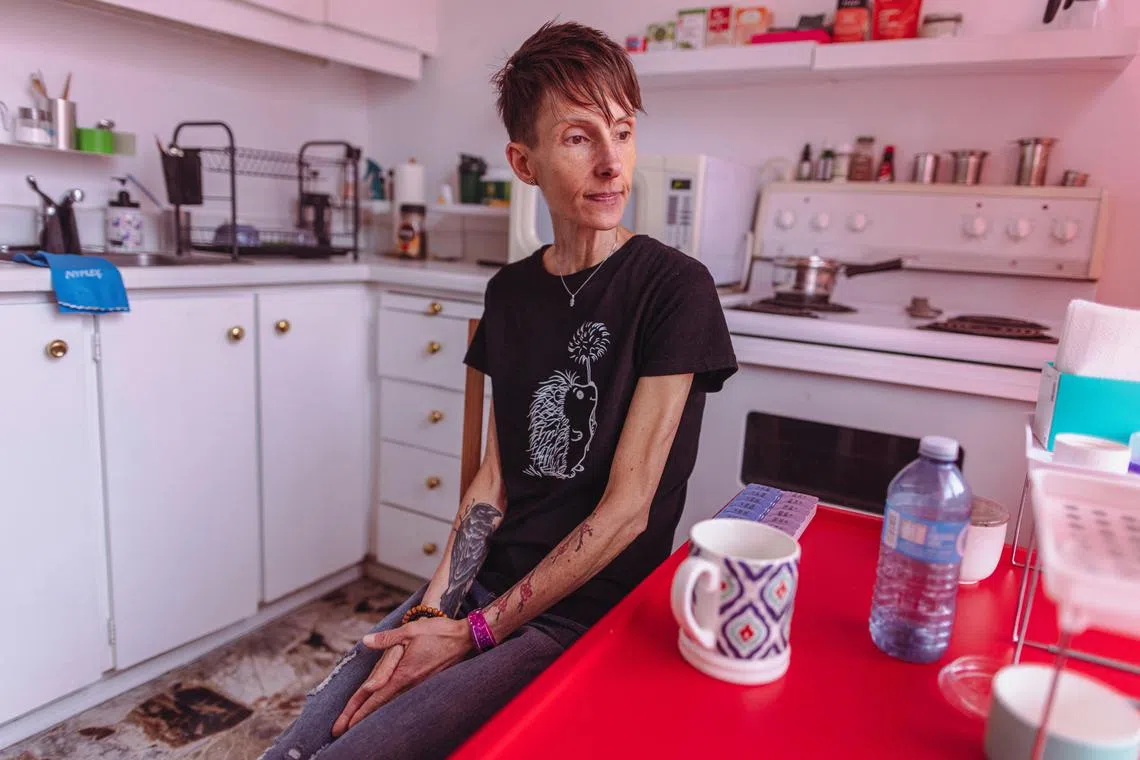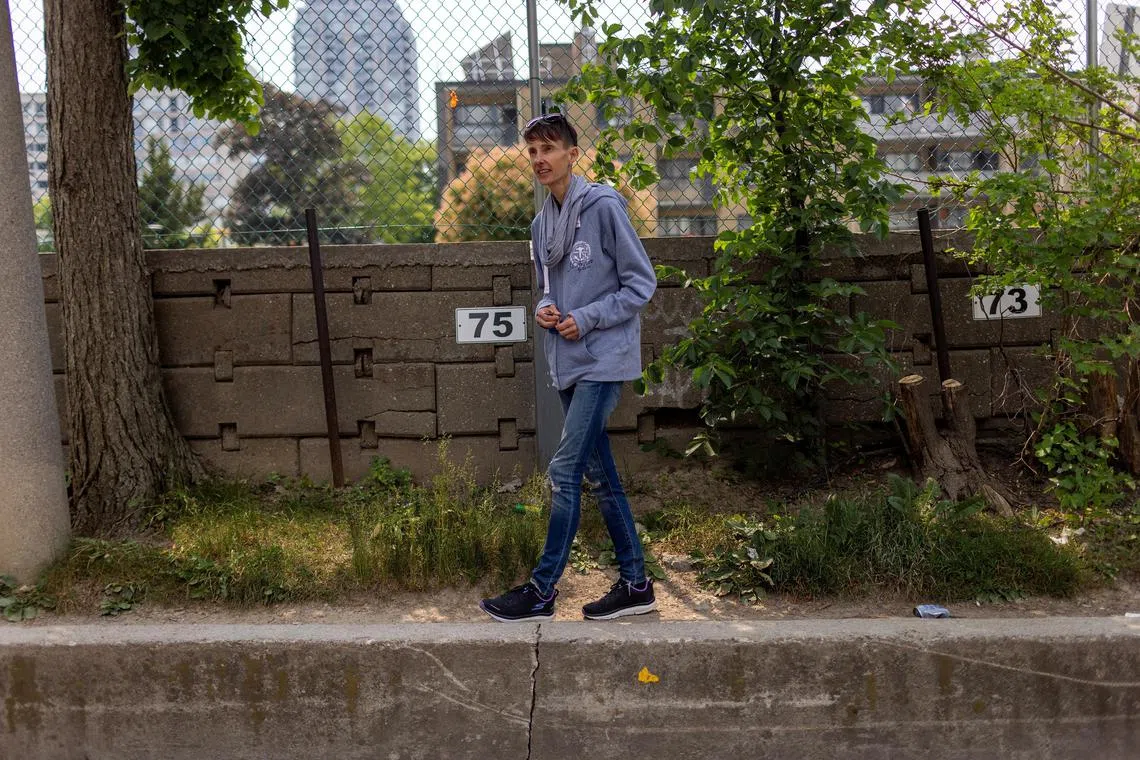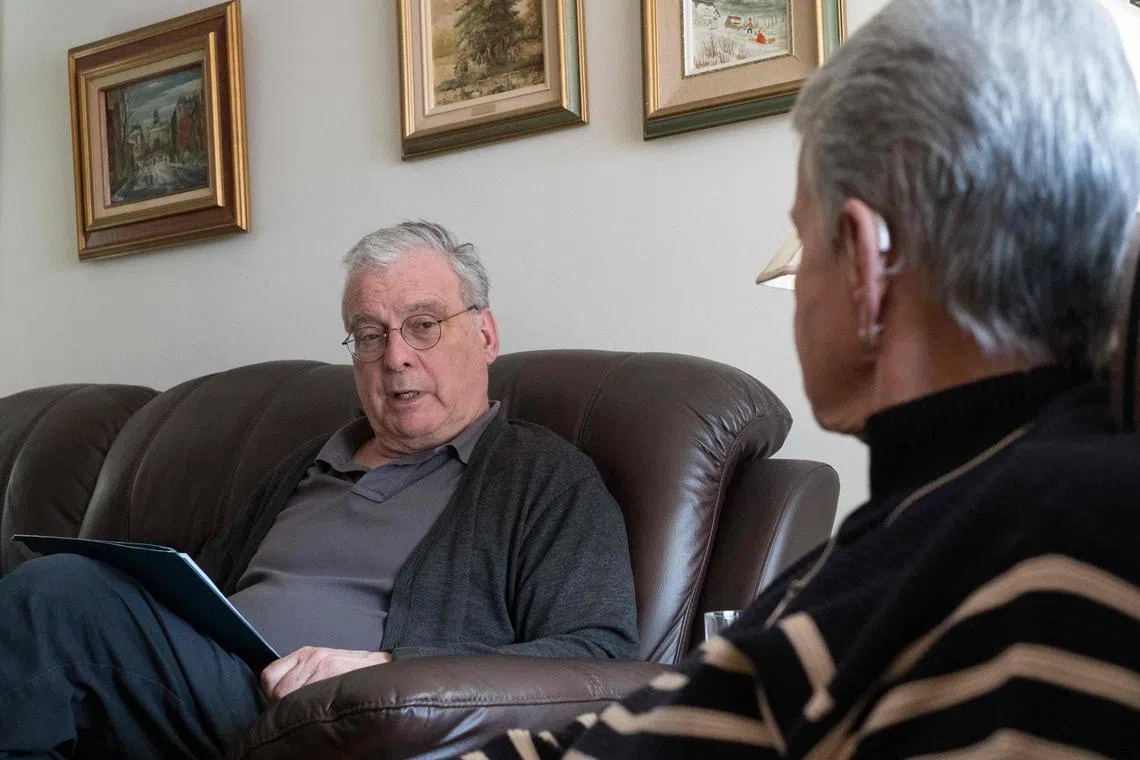She’s 47, anorexic and wants help dying – and Canada will soon allow it
Sign up now: Get ST's newsletters delivered to your inbox

Ms Lisa Pauli has wrestled with the eating disorder anorexia for decades. She weighs just over 40kg and can go for days without eating solid food.
PHOTO: REUTERS
TORONTO - Ms Lisa Pauli wants to die. The 47-year-old has wrestled with the eating disorder anorexia for decades; she says she has had a warped relationship with her body since the age of eight.
These days, Ms Pauli said, she weighs just over 40kg and may go for days without eating solid food. She said she is too weak to carry groceries home without stopping for breaks.
“Every day is hell,” she said. “I’m so tired. I’m done. I’ve tried everything. I feel like I’ve lived my life.”
Ms Pauli cannot legally get medical help to die – yet.
An expansion of the criteria for medically assisted death that comes into force in March 2024 will allow Canadians like Ms Pauli, whose sole underlying condition is mental illness, to choose medically assisted death.
Canada legalised assisted death in 2016 for people with terminal illness and expanded it in 2021 to include people with incurable, but not terminal, conditions. The legal changes were precipitated by court rulings that struck down prohibitions on helping people to die.
The new mental health provision will make Canada one of the most expansive countries in the world when it comes to medical assistance in dying (Maid), according to an expert panel report to Canada’s Parliament.
Proponents of assisted death – which is still a novel concept in many parts of the world – say it is an issue of personal autonomy.
But six disability rights and religious advocates told Reuters that the pace of the planned changes to the assisted death framework in Canada brings additional risks of people opting for Maid because they are unable to access social services – that lack of which could exacerbate their suffering.
Justice Minister David Lametti dismissed criticism that Canada was moving too fast or opening up the system to abuse. Some disability advocates have demanded rolling back the current framework because they argue it puts people with disabilities at risk.
“We have gotten where we are through a number of very prudent steps,” Mr Lametti said in an interview with Reuters in June. “It’s been a slow and careful evolution. And I’m proud of that.”
In 2021, the most recent year available, 10,064 people died through medically assisted death – about 3.3 per cent of deaths in Canada that year. That compared with 4.5 per cent in the Netherlands and 2.4 per cent in Belgium, where assisted dying has been legal since 2002, according to each country’s official data.
The vast majority of assisted deaths in Canada conformed to the legal rules, but provincial authorities deemed a small number worthy of investigation, according to previously unreported provincial government data. Provinces and territories are responsible for healthcare in Canada.

An expansion of the criteria for medically assisted death that comes into force in March 2024 will allow Canadians like Ms Pauli, whose sole underlying condition is mental illness, to choose medically assisted death.
PHOTO: REUTERS
In 2021-22, Quebec found 15 assisted deaths – 0.4 per cent of the total – did not follow the rules. The province referred the cases to Quebec’s self-governing medical body and medical facilities, said provincial spokesman Marie-Claude Lacasse. In six of those cases, the person did not have a serious and incurable condition, according to a provincial commission.
In British Columbia, government officials have referred 19 assisted death cases to regulatory bodies and a further two to law enforcement since 2018, according to a provincial spokesman who did not provide further details.
None of the referrals in the two provinces resulted in disciplinary action for doctors, said regulatory bodies, declining to give further details. Four other provinces reported no problematic cases of medically assisted death. Other provinces and territories including Ontario, Canada’s most populous province, did not respond.
30,000 medically assisted deaths
More than 30,000 people have died with medical assistance in Canada since 2016, more than 10,000 of them in 2021 when the law was expanded to people whose deaths were not “reasonably foreseeable”. Even after the change in the legislation, about 98 per cent of the assisted deaths in 2021 were people deemed near their natural death, according to Health Canada data.
“So far, nothing I see would suggest that we need to worry about having gone too far,” Mr Lametti said.
The procedure is available only to people covered by a Canadian healthcare programme. It requires a written application and assessments from two independent medical practitioners, including at least one specialised in the applicant’s condition if the applicant is not near natural death. The procedure frequently involves an injection administered at home.
Mr Lametti said the federal government is considering recommendations from a parliamentary committee to allow advance requests and “mature minors” – people under the age of 18 deemed capable of making this decision – to access assisted death.
Quebec passed a law on June 7 that would allow people to make advance requests for assisted death, which would go into effect when they reach a predetermined point of incapacity due to Alzheimer’s or similar conditions.
But Dr Georges L’Esperance, president of the Quebec Association for the Right to Die with Dignity, said it could take up to two years for the provision to go into effect.

Dr Georges L’Esperance discusses the procedures associated with medical assistance to die, with a lung cancer patient in Montreal, Canada.
PHOTO: AFP
Dying With Dignity Canada has organised nearly 10,000 letters in 2023 to government officials, seeking to legalise advance requests across Canada, said spokesman Sarah Dobec.
Mr Lametti did not say whether the federal government – which is responsible for administering the criminal code – would challenge Quebec’s law in the courts. When it comes to minors and advance requests, he said, “we need more time” to gauge public opinion and address policy questions.
Ms Pauli first raised the idea of assisted death with psychiatrist Justine Dembo in April 2021.
Dr Dembo served on an expert panel on assisted death and mental illness that presented a report to Canada’s Parliament in 2022. She assesses people for Maid although on that visit, Ms Pauli was seeing her for body dysmorphic disorder.
Ms Pauli has tried a multitude of treatments and has been hospitalised twice, but said she still thinks constantly about what she has eaten and what she will eat.
Dr Dembo told Ms Pauli she could be eligible for assisted death once Canada’s law changes.
“She’s undergone very high-quality treatments and they just have not made an impact,” she said.
When Dr Dembo assesses people for Maid, she said, she treats it as “a last resort”, and tries to determine whether they have received all available medical and social support.
Ms Pauli said she plans to apply for Maid once she is eligible. When she first broached the possibility of getting help to die, her mother, Mrs Mary Heatley, could not accept it.
“The wind was knocked out of me... I just couldn’t imagine her not being in this world,” Mrs Heatley said in an interview.
But she talked to her daughter and realised what she was going through.
“She just could not foresee another 10, 20, whatever years of this, living with this eating disorder,” she said.
“I say to myself, ‘You have to try and remember. This is what she wanted. It’s her life’... And I would just have to go on without her.”
Medical criteria
Some medical experts say mental illness alone should not be a criterion for assisted death. It can be difficult to determine whether a mental illness is truly irremediable, as the law requires, and to differentiate between pathological suicidality and a rational desire to die, said chief psychiatrist Sonu Gaind at Toronto’s Sunnybrook Health Sciences Centre.
“We don’t even understand the biology of most mental illnesses,” he said.
Six activists said Canada’s expansion of assisted death puts people with intellectual and physical disabilities, low incomes or other vulnerabilities at risk.
“My biggest fear is that we go to this absolute terminal end and people die, but we haven’t invested time, money, people in putting the things in place that would mean that people don’t want to consider” assisted death, said Ms Michelle Hewitt, co-chair of advocacy group Disability Without Poverty, in an interview.
Ms Hewitt pointed to a widely reported case of a British Columbia man, Mr Sean Tagert, with amyotrophic lateral sclerosis, or Lou Gehrig’s disease, who opted for medically assisted death in 2019 after he struggled to get 24-hour care.
“He was very clear on what he wanted – more care hours at home – and when he was told he would have to move to a care facility a distance from his family, particularly his young son, he used Maid,” Ms Hewitt wrote in an e-mail.
Social media posts by Mr Tagert’s family said that finding care was “a constant struggle and source of stress for Sean”.
The reported cases of people resorting to medically assisted death in part due to lack of support are “tragic”, Mr Lametti said.
But “you can’t get Maid simply because you’re having some social challenges or economic challenges... Unless they fall into the medical criteria, they can’t access”.
While the reported numbers of problematic assisted deaths in Canada are low, some opponents of assisted death in other jurisdictions are using the country’s experience as a cautionary tale, three people involved in the debate in Britain told Reuters.
“Canada is being used primarily as an argument against us, not an argument in favour,” said Mr Charles Falconer, a British Labour peer who supports assisted death for people with a terminal illness in Britain, where it is not legal.
“It does in one sense (represent a slippery slope), doesn’t it, because it started off with terminal illness and it’s ended up with non-terminal illness and mental illness,” he said. REUTERS


